雅思写作中国传统文化中国节日
雅思写作中国传统文化中国节日

元旦是一年的首日。
“元旦”这一名称,据说起自传说中三皇五帝之一——颛顼。
他以农历正月为元,初一为旦。
“元”含有第一和开始之意,“旦”则是一轮红日从地面开始升起,“元”和“旦”和在一起,就是要人们以蓬勃朝气,来迎接崭新的一年。
这一天,我国城市和农村,都张灯结彩,披上了节日的盛装,不少单位悬起“庆祝元旦”的巨幅标语,欢庆新年。
1949年9月27日,中国人民政治协商会议第一届全体会议决议:“中华人民共和国纪年采用公元纪年法”,即是我们所说的阳历,为了区别农历和阳历两个新年,又鉴于农历二十四节气中的“立春”恰在农历新年的前后,因此便把农历正月初一改称为“春节”,阳历一月一日定为“元旦”,至此,元旦才成为全国人们的欢乐节日。
农历正月初一是春节,又叫阴历(农历)年,俗称“过年”。
这是我国民间最隆重、最热闹的一个古老传统节日。
春节的历史很悠久,它起源于殷商时期年头岁尾的祭神祭祖活动。
有关年的传说也很多。
古代的春节叫“元日”、“元旦”、“新年”。
辛亥革命后,才将农历正月初一正式定名为春节。
漫长的历史岁月使年俗活动内容变得异常丰富多彩。
其中,那些敬天祭神的迷信内容,已逐渐被淘汰,而那些富有生活情趣的内容,像贴春联、贴年画、贴“福”字、剪窗花、蒸年糕、包饺子、燃爆竹、除夕守夜、拜年等习俗至今仍很盛行。
我国最早的春联,是五代时期孟昶写在桃木板上的:“ 新年纳余庆,嘉节号长春”。
用红纸写春联始于明朝。
年画源于唐朝的门神,它和燃爆竹一样,在古代都是用来驱鬼避邪的,现在却成了专为增加喜庆气氛的习俗了。
贴“福”字在宋朝以前就有了,人们把写在红方纸上的“福”字,故意倒贴在门、窗、家俱上,取其“福到(倒)了”之意。
除夕守岁是最重要的年俗,这在魏晋时期就有记载。
除夕晚上,与家老小熬年守岁,欢聚酣饮,共享天伦之乐,这是炎黄子孙至今仍很重视的年俗。
待第一声鸡啼之后,新的一年开始了,男女老少均着节日盛装,先给家族中的长者拜年祝寿,然后走亲串友,相互道贺祝福。
雅思写作模板 雅思写作高分词汇文化类 传统节日traditional festivals.doc

雅思写作模板雅思写作高分词汇文化类传统节日traditional festivals今天我们雅思写作的相关文章来研究下文化类话题下人们是否遗忘传统节日的含义的问题。
按照惯例,小编会给出具体的题目,相应的雅思写作高分词汇,以及大致的汉语思路。
题目Most people have forgotten the meaning behind traditional or religious festivals; during festival periods, people nowadays only want to enjoy themselves. To what extent do you agree or disagree with this opinion?大多数人已经忘记了传统节日和宗教节日背后的含义。
在节日期间,人们只想要休闲娱乐。
在多大程度上你同意或者不同意这一观点。
雅思写作高分词汇-文化类-传统节日traditional festivalsthe original meaning 最初的含义treat them as opportunities to…把它们看作是…的机会to be the priority 是优先目标times for celebration 庆祝的时刻festival period 节日时期are most concerned with 最关心…decorating their homes 装饰他们的家look forward to…期待…associate this occasion with…将这一场景与…联系起来primary goal 人们最主要的目标underlying meaning 潜在的含义religious content 宗教内容pass knowledge on to the next generation 将知识传递给下一代deeper significance 更深的重要性historical background 历史背景are still aware of …仍然知道…雅思写作思路-文化类-传统节日traditional festivals开头段1. 一些人认为我们不再记得节日最初的含义,并且大多数人都将其当作是休闲娱乐的机会。
中国节日文化的英语作文
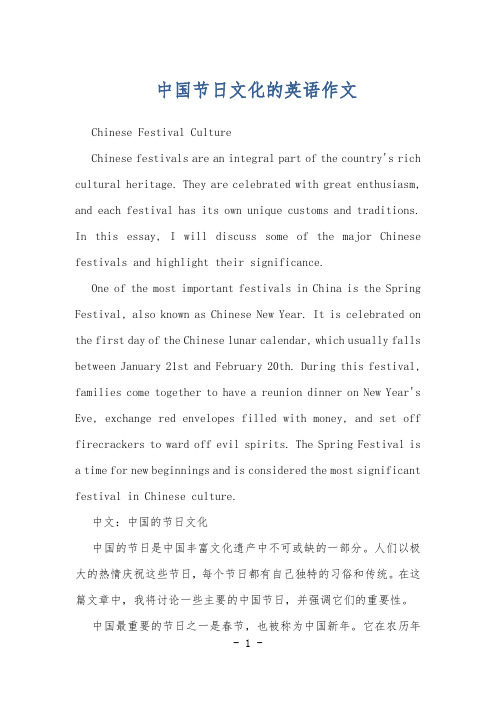
中国节日文化的英语作文Chinese Festival CultureChinese festivals are an integral part of the country's rich cultural heritage. They are celebrated with great enthusiasm, and each festival has its own unique customs and traditions. In this essay, I will discuss some of the major Chinese festivals and highlight their significance.One of the most important festivals in China is the Spring Festival, also known as Chinese New Year. It is celebrated on the first day of the Chinese lunar calendar, which usually falls between January 21st and February 20th. During this festival, families come together to have a reunion dinner on New Year's Eve, exchange red envelopes filled with money, and set off firecrackers to ward off evil spirits. The Spring Festival is a time for new beginnings and is considered the most significant festival in Chinese culture.中文:中国的节日文化中国的节日是中国丰富文化遗产中不可或缺的一部分。
描写中国传统节日英语作文(通用21篇)
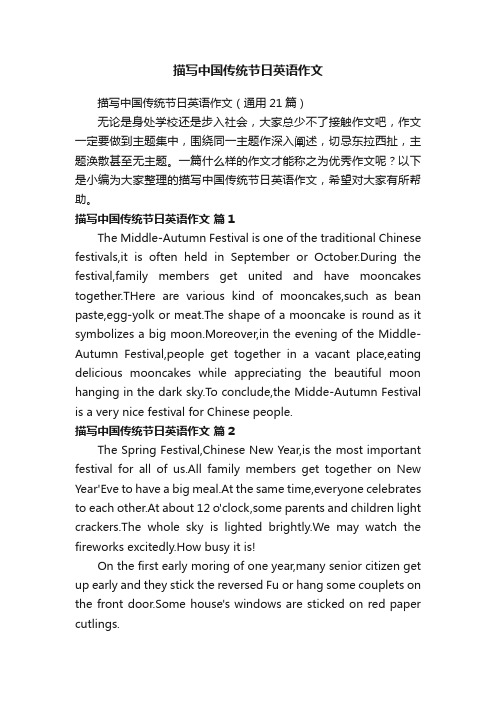
描写中国传统节日英语作文描写中国传统节日英语作文(通用21篇)无论是身处学校还是步入社会,大家总少不了接触作文吧,作文一定要做到主题集中,围绕同一主题作深入阐述,切忌东拉西扯,主题涣散甚至无主题。
一篇什么样的作文才能称之为优秀作文呢?以下是小编为大家整理的描写中国传统节日英语作文,希望对大家有所帮助。
描写中国传统节日英语作文篇1The Middle-Autumn Festival is one of the traditional Chinese festivals,it is often held in September or October.During the festival,family members get united and have mooncakes together.THere are various kind of mooncakes,such as bean paste,egg-yolk or meat.The shape of a mooncake is round as it symbolizes a big moon.Moreover,in the evening of the Middle-Autumn Festival,people get together in a vacant place,eating delicious mooncakes while appreciating the beautiful moon hanging in the dark sky.To conclude,the Midde-Autumn Festival is a very nice festival for Chinese people.描写中国传统节日英语作文篇2The Spring Festival,Chinese New Year,is the most important festival for all of us.All family members get together on New Year'Eve to have a big meal.At the same time,everyone celebrates to each other.At about 12 o'clock,some parents and children light crackers.The whole sky is lighted brightly.We may watch the fireworks excitedly.How busy it is!On the first early moring of one year,many senior citizen get up early and they stick the reversed Fu or hang some couplets on the front door.Some house's windows are sticked on red paper cutlings.The Chinese New Year lasts fifteen days.So during the fifteen days,we always visit our relatives from door to door.At that time,children are the happiest because they can get many red packets form their parents,grandparents,uncles,aunts and so on.The last day of the Chinese New Year is another festival.It names the Lantern Festival.So the Chinese New Year comes to the end.描写中国传统节日英语作文篇3There are a lot of holidays for chinese people,such as Nationalday,May Day,etc.However,chinese people look on spring festival as their most important one of all.And it's also my favorite festival,especially when I was a child,because In those days,I could have a plenty of delicious food to eat,enjoy a very long holiday and wear beautiful clothes.And what is more important is that I could received much new year's gift money.So,everyyear,I expected the spring festival would come soon.After I grew up,it's no longer as important to me as before .For I can have my delicious food and wear my favorite clothes every day.It's like I'm having spring festival every day!一年有很多节日,如国庆节,劳动节等等,但中国人看的最重的还是春节。
中国文化或节日英语作文
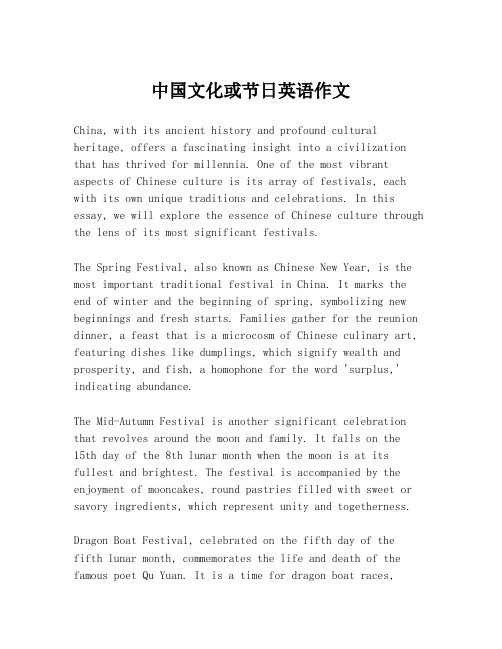
中国文化或节日英语作文China, with its ancient history and profound cultural heritage, offers a fascinating insight into a civilization that has thrived for millennia. One of the most vibrant aspects of Chinese culture is its array of festivals, each with its own unique traditions and celebrations. In this essay, we will explore the essence of Chinese culture through the lens of its most significant festivals.The Spring Festival, also known as Chinese New Year, is the most important traditional festival in China. It marks the end of winter and the beginning of spring, symbolizing new beginnings and fresh starts. Families gather for the reunion dinner, a feast that is a microcosm of Chinese culinary art, featuring dishes like dumplings, which signify wealth and prosperity, and fish, a homophone for the word 'surplus,' indicating abundance.The Mid-Autumn Festival is another significant celebration that revolves around the moon and family. It falls on the15th day of the 8th lunar month when the moon is at its fullest and brightest. The festival is accompanied by the enjoyment of mooncakes, round pastries filled with sweet or savory ingredients, which represent unity and togetherness.Dragon Boat Festival, celebrated on the fifth day of thefifth lunar month, commemorates the life and death of the famous poet Qu Yuan. It is a time for dragon boat races,which are not only competitive but also symbolic of theancient legend of searching for Qu Yuan's body in the Miluo River. Zongzi, a traditional Chinese food made of glutinous rice stuffed with various fillings and wrapped in bamboo leaves, is the festival's culinary highlight.The Qingming Festival, or Tomb-Sweeping Day, is a time to honor ancestors and the deceased. It is a tradition for families to visit the graves of their ancestors to clean the tombstones, offer food, and burn incense. This festival is a testament to the Chinese culture's deep respect for its ancestors and the continuity of family lineage.These festivals are not just celebrations; they are a living, breathing part of Chinese culture that has been passed down through generations. They are a way for the Chinese people to connect with their roots, their heritage, and with each other. The customs, foods, and stories associated with thesefestivals are a testament to the richness of Chinese culture and its ability to adapt and thrive over time.In conclusion, the festivals of China are a window into the heart of its culture. They are a celebration of life, a remembrance of history, and a connection to the past. AsChina continues to modernize and evolve, these festivals remain a constant, a reminder of the traditions that have shaped the nation and will continue to do so for generationsto come.。
关于中国文化节日的英语作文80词
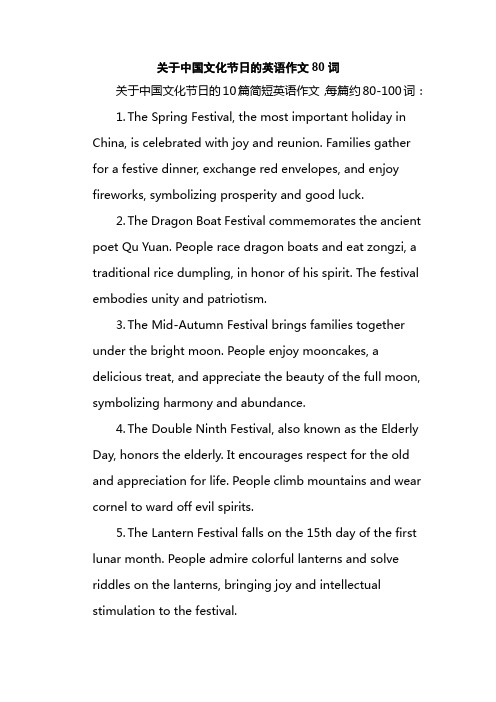
关于中国文化节日的英语作文80词关于中国文化节日的10篇简短英语作文,每篇约80-100词:1.The Spring Festival, the most important holiday in China, is celebrated with joy and reunion. Families gather for a festive dinner, exchange red envelopes, and enjoy fireworks, symbolizing prosperity and good luck.2.The Dragon Boat Festival commemorates the ancient poet Qu Yuan. People race dragon boats and eat zongzi, a traditional rice dumpling, in honor of his spirit. The festival embodies unity and patriotism.3.The Mid-Autumn Festival brings families together under the bright moon. People enjoy mooncakes, a delicious treat, and appreciate the beauty of the full moon, symbolizing harmony and abundance.4.The Double Ninth Festival, also known as the Elderly Day, honors the elderly. It encourages respect for the old and appreciation for life. People climb mountains and wear cornel to ward off evil spirits.5.The Lantern Festival falls on the 15th day of the first lunar month. People admire colorful lanterns and solve riddles on the lanterns, bringing joy and intellectual stimulation to the festival.6.The Qingming Festival is a time for remembering ancestors. People visit graves, offer incense and paper money, and clean the tombs to honor their forebears. It's a ceremony of respect and filial piety.7.The Chongyang Festival is marked by hiking and appreciation of autumn scenery. It's a time for refreshing oneself and connecting with nature, promoting health and longevity.8.The Winter Solstice Festival, or Dongzhi, is a traditional holiday for family reunions. People eat dumplings and other festive foods, and some regions have unique customs like making "Yangsheng" food to nourish the body.9.The Qixi Festival, also known as the Chinese Valentine's Day, celebrates romantic love. Legends of the Cowherd and the Weaver Maid enrich the festival's romantic atmosphere, and young lovers pray for a happy and lasting relationship.10.The Tuen Ng Festival, observed by ethnic minorities in southern China, features singing and dancing performances. It's a vibrant celebration of cultural diversity and unity within China.。
中国节日英文作文三篇
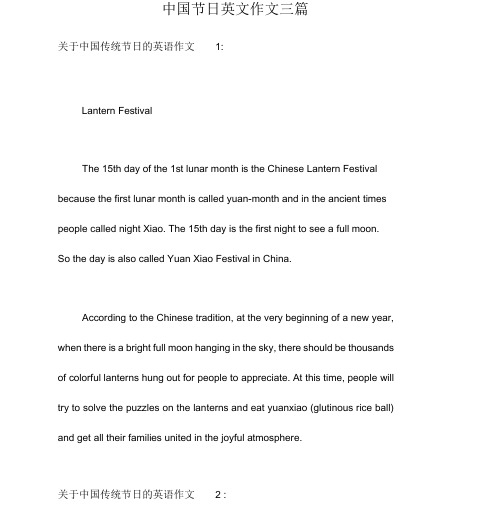
中国节日英文作文三篇关于中国传统节日的英语作文1:Lantern FestivalThe 15th day of the 1st lunar month is the Chinese Lantern Festival because the first lunar month is called yuan-month and in the ancient times people called night Xiao. The 15th day is the first night to see a full moon. So the day is also called Yuan Xiao Festival in China.According to the Chinese tradition, at the very beginning of a new year, when there is a bright full moon hanging in the sky, there should be thousands of colorful lanterns hung out for people to appreciate. At this time, people will try to solve the puzzles on the lanterns and eat yuanxiao (glutinous rice ball) and get all their families united in the joyful atmosphere.关于中国传统节日的英语作文 2 :Chinese traditional festivals in various forms, rich in content, are our long history of the Chinese nation as an integral part of culture.Holiday of the origin and development is a gradual formation, exerts a subtle sound, and slowly infiltrated into the process of social life. It and social development, as are the development of humansociety to a certain stage of the product of our country these ancient holiday, most of them and astronomy, calendar, mathematics, and later carved out of the weather-related, at least on this from the literature can be traced back to "Summer is small" , "Book of History" to the Warring States period, the year the division of 24 solar terms, has been basically in place, then the traditional holiday, all closely related to these Terms.Terms for the selection of holiday, subject to the conditions provided, the majority of holiday at the pre-Qin period, had been the horizon, but one of the custom content-rich and popular, but also has required a long process of development. Activity are the 第2 页共6 页earliest and original customs of worship, superstition, taboo-related; myth legend to add a few holiday romantic; have on the religious holiday of the impact and effects; some historical figures have been given the timeless holiday Memory infiltration, all of which are integration of the content of cohesion holiday, the holiday so that the Chinese have a deep sense of history.To the Han Dynasty, China's major traditional festivals have been stereotyped, it is often said these holiday originated in the HanDynasty, the Hanare China's reunification after the first major period of development, political and economic stability, science and culture has developed greatly, and this holiday The final form provides a good social conditions.Holiday developed to the Tang Dynasty, from the original worship, taboos mysterious atmosphere of liberation, to entertainment etiquette type, becomereally good time of the festive season. Since then, the holiday has become a lively celebration, colorful, many sports, pleasure-seeking activitiesof the contents of the scene and quickly became a popular fashion, these customs has continued the development of enduring.It is worth mentioning that, in the long course of history, the ancient literati, poets of letters for a holiday to write a lot of famous through the ages, the poetry of well-known and was widely famous, so that our country's traditional holiday of deep infiltration culture, wonderful romance, big vulgar shows of Taiga, tastes.Chinese holiday there is a strong cohesion and a wide range of inclusive, one to the holidays, of national jubilation, which is a long history of our nation's long history of same, is a valuable spiritual heritage.The formation of traditional festivals, are a nation or country's history and culture of long-term accumulation of condensation process, the following list of those festivals, all are coming from the ancient development, so far from these popular holiday custom, but also can clearly see the the people of ancientsocial life and wonderful pictures.关于中国传统节日的英语作文3:The first day of the Lunar New Year is the welcoming of the gods of the heavens and earth.Many people abstain from meat on the first day of the new year because it is believed that this will ensure long and happy lives for them.On the second day, the Chinese pray to their ancestors as well as to all the gods. They are extra kind to dogs and feed them well as it is believed that the second day is the birthday of all dogs.The third and fourth days are for the sons-in-laws to pay respect to their parents-in-law.The fifth day is called Po Woo. On that day people stay home to welcome the God of Wealth. No one visits families and friends on the fifth day because it will bring both parties bad luck.On the sixth to the 10th day, the Chinese visit their relatives and friends freely. They also visit the temples to pray for good第5页共6页fortune and health.The seventh day of the NewYear is the day for farmers to display their produce. These farmers make a drink from seven types of vegetables to celebrate the occasion. The seventh day is also considered the birthday of human beings. Noodles are eaten to promote longevity and raw fish for success.On the eighth day the Fujian people have another family reunion dinner, and at midnight they pray to Tian Gong, the God of Heaven.The ninth day is to make offerings to the Jade Emperor.The 10th through the 12th are days that friends and relatives should be invited for dinner. After so much rich food, on the 13th day you should have simple rice congee and mustard greens (choi sum) to cleanse the system.The 14th day should be for preparations to celebrate the Lantern Festival which is to be held on the 15th night.第6页共6页。
雅思口语高分范文:中国的节日
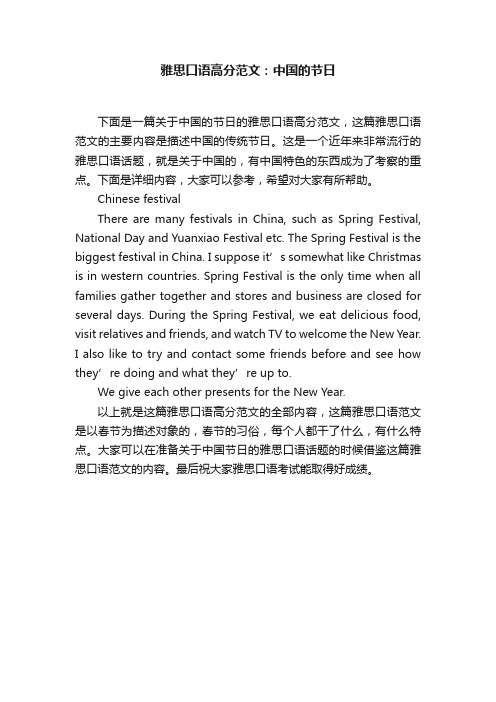
雅思口语高分范文:中国的节日下面是一篇关于中国的节日的雅思口语高分范文,这篇雅思口语范文的主要内容是描述中国的传统节日。
这是一个近年来非常流行的雅思口语话题,就是关于中国的,有中国特色的东西成为了考察的重点。
下面是详细内容,大家可以参考,希望对大家有所帮助。
Chinese festivalThere are many festivals in China, such as Spring Festival, National Day and Yuanxiao Festival etc. The Spring Festival is the biggest festival in China. I suppose it’s somewhat like Christmas is in western countries. Spring Festival is the only time when all families gather together and stores and business are closed for several days. During the Spring Festival, we eat delicious food, visit relatives and friends, and watch TV to welcome the New Year.I also like to try and contact some friends before and see how they’re doing and what they’re up to.We give each other presents for the New Year.以上就是这篇雅思口语高分范文的全部内容,这篇雅思口语范文是以春节为描述对象的,春节的习俗,每个人都干了什么,有什么特点。
大家可以在准备关于中国节日的雅思口语话题的时候借鉴这篇雅思口语范文的内容。
- 1、下载文档前请自行甄别文档内容的完整性,平台不提供额外的编辑、内容补充、找答案等附加服务。
- 2、"仅部分预览"的文档,不可在线预览部分如存在完整性等问题,可反馈申请退款(可完整预览的文档不适用该条件!)。
- 3、如文档侵犯您的权益,请联系客服反馈,我们会尽快为您处理(人工客服工作时间:9:00-18:30)。
元旦是一年的首日。
“元旦”这一名称,据说起自传说中三皇五帝之一——颛顼。
他以农历正月为元,初一为旦。
“元”含有第一和开始之意,“旦”则是一轮红日从地面开始升起,“元”和“旦”和在一起,就是要人们以蓬勃朝气,来迎接崭新的一年。
这一天,我国城市和农村,都张灯结彩,披上了节日的盛装,不少单位悬起“庆祝元旦”的巨幅标语,欢庆新年。
1949年9月27日,中国人民政治协商会议第一届全体会议决议:“中华人民共和国纪年采用公元纪年法”,即是我们所说的阳历,为了区别农历和阳历两个新年,又鉴于农历二十四节气中的“立春”恰在农历新年的前后,因此便把农历正月初一改称为“春节”,阳历一月一日定为“元旦”,至此,元旦才成为全国人们的欢乐节日。
农历正月初一是春节,又叫阴历(农历)年,俗称“过年”。
这是我国民间最隆重、最热闹的一个古老传统节日。
春节的历史很悠久,它起源于殷商时期年头岁尾的祭神祭祖活动。
有关年的传说也很多。
古代的春节叫“元日”、“元旦”、“新年”。
辛亥革命后,才将农历正月初一正式定名为春节。
漫长的历史岁月使年俗活动内容变得异常丰富多彩。
其中,那些敬天祭神的迷信内容,已逐渐被淘汰,而那些富有生活情趣的内容,像贴春联、贴年画、贴“福”字、剪窗花、蒸年糕、包饺子、燃爆竹、除夕守夜、拜年等习俗至今仍很盛行。
我国最早的春联,是五代时期孟昶写在桃木板上的:“ 新年纳余庆,嘉节号长春”。
用红纸写春联始于明朝。
年画源于唐朝的门神,它和燃爆竹一样,在古代都是用来驱鬼避邪的,现在却成了专为增加喜庆气氛的习俗了。
贴“福”字在宋朝以前就有了,人们把写在红方纸上的“福”字,故意倒贴在门、窗、家俱上,取其“福到(倒)了”之意。
除夕守岁是最重要的年俗,这在魏晋时期就有记载。
除夕晚上,与家老小熬年守岁,欢聚酣饮,共享天伦之乐,这是炎黄子孙至今仍很重视的年俗。
待第一声鸡啼之后,新的一年开始了,男女老少均着节日盛装,先给家族中的长者拜年祝寿,然后走亲串友,相互道贺祝福。
此时的神州大地,处处闪光溢彩,从初一到十五,人们一至沉浸在欢乐、祥和、文明的节日气氛中。
田家元旦孟浩然昨夜斗回北今朝岁起东我年已强仕无禄尚忧农桑野就耕父荷锄随牧童田家占气候共说此年丰元日王安石爆竹声中一岁除春风送暖入屠苏千门万户日总把新桃换旧符元日王安石爆竹声中一岁除春风送暖入屠苏千门万户日总把新桃换旧符元日王安石爆竹声中一岁除春风送暖入屠苏千门万户日总把新桃换旧符农历正月十五夜,是我国民间传统的元宵节,又称上元节,灯节。
正月十五闹元宵,将从除夕开始延续的庆祝活动推向又一个高潮。
元宵之夜,大街小巷张灯结彩,人们赏灯,猜灯谜,吃元宵,成为世代相沿的习俗。
元宵节赏灯的习俗始于汉朝。
隋唐时发展成盛大的灯市。
到宋元时期,京都灯市常常绵延数十里。
灯会的时间,汉朝只限于正月十五一夜,唐玄宗延长到三夜,到明朝规定从正月初八一直持续到正月十七。
唐朝灯会中出现了杂耍技艺,宋代开始有灯谜。
明朝有增加了戏曲表演。
灯市所用的彩灯,也演绎出“ 橘灯” 、“ 绢灯” 、“ 五彩羊皮灯” 、“ 无骨麦秸灯” 、“ 走马灯” 、“ 孔明灯” 等等。
始于南宋的灯谜,生动活泼,饶有风趣。
经过历代发展创造,至今仍在使用的谜格有粉底格、秋千格、卷帘格、白头格、徐妃格、求凤格等一百余种,大多有限定的格式和奇巧的要求,巧立名目,妙意横生元宵节吃元宵的习俗始于宋朝。
意在祝福全家团圆和睦,在新的一年中康乐幸福。
元宵分实心和带馅两种。
有香辣甜酸咸五味。
可以煮、炒、油炸或蒸制。
桂花酒酿元宵、以肉馅、豆沙、芝麻、桂花、果仁制成的五味元宵以及用葱、芥、蒜、韭、姜制成的象征勤劳、长久、向上的五辛元宵都各有特色。
清明既是二十四节气之一,又是一个历史悠久的传统节日。
清明按农历计就没定月没定日,但都在二月或三月;即上一年的冬至过了 106 天就是清明;按阳历计则为 4 月 5 日或 4 日(以当年二月平或 29 日而差异)。
清明的前一天称寒食节。
两节恰逢阳春三月,春光明媚,桃红柳绿,一派欣欣向荣的气象。
寒食节的设立是为了纪念春秋时代晋朝“ 士甘焚死不公侯” 的介子推。
清明寒食期间,民间有禁火寒食、祭祖扫墓、踏青郊游等习俗。
另外还有荡秋千、放风筝、拔河、斗鸡、戴柳、斗草、打球等传统活动。
使清明成为一个富有诗意的节日。
农历五月初五,是我国传统的端午节。
端午节的起源有两种说法,一说是为了纪念屈原,一说源于田文端午立新规。
∙据说当初屈原投江之后,每到五月五日屈原的祭日,人们都把米饭扔到河里纪念屈原。
一天晚上,有人梦见屈原面黄肌瘦,就连忙上前询问。
原来,百姓投往河里的米饭,都被鱼鳖虾蟹吃掉了。
屈原无食充饥,所以日渐消瘦。
他左思右想,不知怎样才能不让鱼鳖虾蟹吃米饭。
屈原告诉他,如果用箬竹叶包饭,做成尖角的角黍(即粽子),鱼鳖虾蟹见了,以为是菱角,它们就不敢再吃了。
那人醒后,就把此梦转告给乡邻。
第二年的端午节,人们就照梦中屈原说的方法去做。
不久,屈原又托梦给那人,感谢人们送去的粽子。
后来,人们都这样去做,渐渐形成了包角粽的习惯。
∙老百姓把源于田文的说法都称为“躲五”。
传说古代的时候,人们把五月称为恶月,五月五日为恶日,此日生的孩子为“五日子”。
“五日子”是父母的克星,谁也不敢抚养。
齐国的田文是“五日子”,父亲几次要害死他,多亏母亲保护,他才幸免于难。
但父亲命令他,每到五月初五这天,他必须到外祖母家去“躲五”。
田文长大以后,做了宰相,便下令改“躲五”为“端午”,说五月五日是个端端正正的吉利日子,此日生的孩子一律不准加害,也毋须到外祖母家去“躲五”。
自此以后,便有了端午节。
在端午节的风俗中,除人们熟知的赛龙、吃棕子、插艾蒲、戴荷包、洗药浴等祭奠、庆贺、文体活动外,还有许多鲜为人知的奇趣。
∙名称最多的节日端午节的名称在中国所有传统节日中叫法最多,堪称节日别名最多。
究竟有多少,目前还没有一个准确权威的统计。
据统计的资料就达二十多个,但含义不尽相同。
如有端午节、端五节、端阳节、重五节、重午节、天中节、夏节、五月节、菖节、蒲节、龙舟节、浴兰节、棕子节等等。
∙同风异俗的节日同为端午节,全国多在五月初五日过节,唯有福建有些地方是在五月四日过节原因是说五代十国时闽国建立者(即闽王)王审知死于五月五日,故避之。
同为赛龙舟,湖北秭归(屈原故乡)正式比赛是在五月十三、十四、十五三天别的地方是在初五这天。
江西一些水浅干旱之地,不是在水上龙舟竞赛夺标,而是在陆上跑旱船、爬高比赛。
同是佩符避邪,各地佩带物也有差异:江苏女子带用各色草花做成的五毒花,妇女头上插绒制虎,儿童背上负绸制虎,而河北丰润一带却用棉花布缝制成小狗、小人、小口袋带在孩子身上。
青海湟源一带所带香包,已不单是别处的驱秽作用,而成了爱情的信物,女子精心缝制于端午节送于情人。
在各地除了吃粽子风俗外,还有吃年糕、馄饨、油果、咸甜鸡鸭、鹅蛋、蒜瓣等习俗、浙江端午的骆驼蹄糕就很有名气。
∙在外国过的节日外国也有端午节。
在朝鲜,端午节这天也有用艾蒲的习惯。
不同的是,中国插艾叶、插菖蒲,或饮雄黄菖蒲酒;而朝鲜是吃艾饼,洗菖蒲澡。
他们不是祭屈原,而是用艾饼、松皮饼祭祖先。
他们不竟龙舟而是摔跤、打秋千。
日本的端午节与我国的习俗差不多:插艾草、吃粽子,沿海也要举行类似赛龙舟的活动叫“相会”、“爬龙”。
有男孩的家庭,还要挂鲤鱼旗,期望儿子“鲤鱼跳龙门”。
新加坡在端午节这天举行全国龙舟大赛。
在美国从1979年开始,在波士顿儿童博物馆举行一年一度的波士顿龙舟会,并逐步形成了中国传统的文化节日。
农历八月十五日,是我国传统的中秋节,也是我国仅次于春节的第二大传统节日。
八月十五恰在秋季的中间,故谓之中秋节。
我国古历法把处在秋季中间的八月,称谓“仲秋”,所以中秋节又叫“仲秋节”。
中秋之夜,月色皎洁,古人把圆月视为团圆的象征,因此,又称八月十五为“团圆节”。
古往今来,人们常用“月圆”“月缺”来形容“悲欢离合”,客居他乡的游子,更是以月来、寄托深情。
唐代诗人李白的“举头望明月,低头思故乡”,杜甫的“露从今夜白,月是故乡明”,宋代王安石的“春风又绿江南岸,明月何时照我还”等诗句,都是千古绝唱。
俗。
古代帝王有春天祭日,秋天祭月的社制,民家也有中秋祭月之风,到了后来赏月重于祭月,严肃的祭祀变成了轻松的欢娱。
中秋赏月的风俗在唐代极盛,许多诗人的名篇中都有咏月的诗句,宋代、明代、清代宫廷和民间的拜月赏月活动更具规模。
我国各地至今遗存着许多“拜月坛”、“拜月亭”、“望月楼”的古迹。
北京的“月坛”就是明嘉靖年间为皇家祭月修造的。
每当中秋月亮升起,于露天设案,将月饼、石榴、枣子等瓜果供于桌案上,拜月后,全家人围桌而坐,边吃边谈,共赏明月。
现在,祭月拜月活动已被规模盛大、多彩多姿的群众赏月游乐活动所替代。
从唐代以后越来越考究。
苏东坡有诗写道:“小饼如嚼月,中有酥和饴”,清朝杨光辅写道:“月饼饱装桃肉馅,雪糕甜砌蔗糖霜”。
看来当时的月饼和现在已颇为相近了。
农历九月九日,是我国传统的重阳节。
我国古代以“六” 为阴数,“九”为阳数,九月九日正好是两个阳数相重,所以叫“重阳”,也叫“重九”。
重阳节的起源可追溯到西汉初期,但其名称见诸于记载却在三国时代。
古老的重阳节风俗虽多,但主要是登高、插茱萸、赏菊和饮菊花酒。
九月重阳,天高云淡,金风送爽,正是登高远眺的好季节,因此,登高便成了重阳节的重要习俗。
据西汉时的《长安志》记载,京城长安城外专门筑了一个高台,每逢重九,帽子上插着茱萸的人们纷纷登上高台,游玩观景非常热闹。
到了三国和晋代,登高活动更为普遍,历代诗人留下许多“重阳诗”、“登高诗”。
诗人李白写道:“九日天气晴,登高无秋云,造化辟山岳,了然楚汉分。
”登高之俗始于西汉,刘歆《西京杂记》云:“三月上已,九月重阳,士女游戏,就此祓禊登高” 作者将重九与重三相对,并指出了登高驱邪免祸的用意。
重阳前后,菊花盛开,赏菊饮酒便成了节日另一重要习俗。
我国是菊花的故乡,自古培种菊花就很普遍。
用菊花泡的酒,既能防止疫病,又可益寿延年。
每逢节日,除登高插茱萸外,亲友们三五相邀,同饮菊酒,共赏黄花,确实别有一番情趣。
特别是诗人们,赏菊饮酒,吟诗唱酬,给后世留下不少佳句。
王维诗云:“独在异乡为异客,每逢佳节倍思亲,遥知兄弟登高处,遍插茱萸少一人。
”为后世所称诵。
杜牧:九日齐山登高江涵秋影雁初飞,与客携壶上翠微。
尘世难逢开口笑,菊花须插满头归。
但将酩酊酬佳节,不作登临恨落晖。
古往今来只如此,牛山何必独沾衣。
重阳节登高赏菊之俗,至今在我国民间盛行。
近几年,许多省市取“久久”长寿之义,确定重阳节为“老人节”,这充分体现了我们民族尊老敬老的优良传统。
